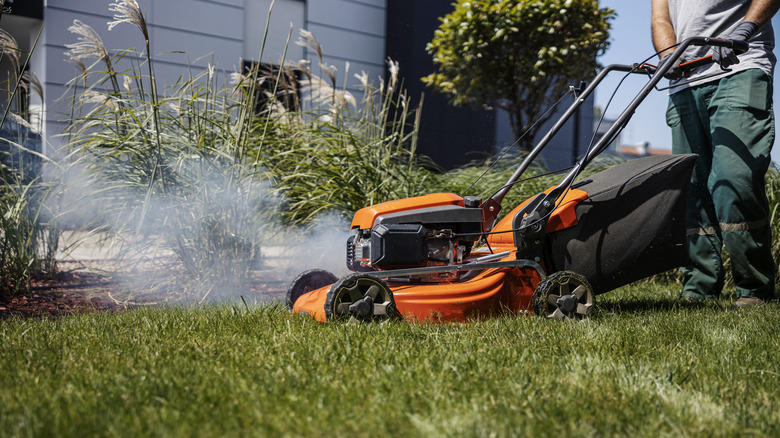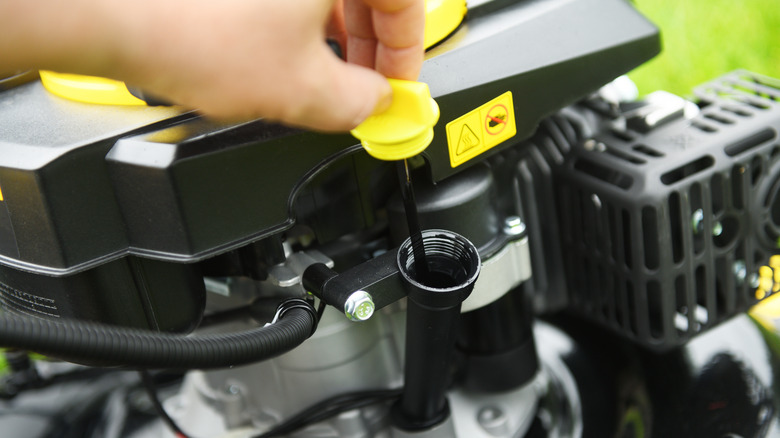Why Your Lawn Mower Is Smoking (And How To Fix It)
Finding the right mower for your yard, one that runs smoothly, cuts the grass well, and has plenty of power, is worth the effort and research it takes. Comparing self-propelled versus push mowers to decide which is best for your lawn and knowing which lawn mower brands to steer clear of are all part of the process. After all, you want to invest in a great mower that will get the job done right. With all the time and money spent on finding a perfect lawn mower, the last thing you want to see is smoke coming from it when you use it. The good news is that smoke doesn't always mean expensive repair bills. It can be as simple as replacing a dirty air filter, removing a cracked gasket, or burning off oil spilled on the engine.
Common causes of a smoking lawn mower can include blocked air filters, leaking or spilled oil, carburetor issues, or worn-out engine parts. The latter is especially true for older machines. If you have an electric mower, there could be a problem with the motor. The color of the smoke your mower is producing can help you determine the problem, too. No matter what is causing your lawn mower to smoke, it's important to deal with it right away so the issue doesn't get worse. Regular preventive maintenance can also help you avoid most of the causes of a smoking lawn mower.
The color of the smoke coming from the mower is a clue
Black smoke typically indicates a problem somewhere in the fuel system. It could be something simple, like a dirty air filter that needs to be changed, or it could be a more serious problem involving the carburetor. For the latter, you'll need to enlist the services of a professional repairperson, unless you know how to fix small engines. White smoke is usually caused by oil spilling onto the engine, either from overfilling the oil reservoir or missing the hole while refilling it. White smoke can also indicate a blown head gasket, which is a much more serious problem that requires professional repair.
Blue smoke, like white smoke, is an indication of excess oil on the engine. Damaged head gaskets, oil spilled on the engine, and a tipped lawn mower are all common causes of blue smoke. If your mower is new, you may also notice blue smoke when you first start it, but this typically goes away if you leave the motor running for 15 minutes. Grey smoke may mean the mower's engine is burning oil. This usually happens in older, worn-out lawn mowers. Grey smoke may also mean that the oil levels are low and need to be refilled, an issue that can severely harm your lawn mower. It is important to check the oil level regularly and top it off accordingly. Leaky valve seals and broken piston rings can also cause grey smoke and usually mean the engine has had it.
How to fix a smoking mower and preventative maintenance
If your lawn mower is smoking after you start it, turn it off immediately. Before checking the engine, let it cool down so you don't get burned. Once the engine is sufficiently cool, check the air filter and either clean it or replace it. Wipe any oil residue off the engine. If your oil reservoir is overfilled, remove some of the excess oil by siphoning it out or using a turkey baster or a large plastic syringe. If you spilled oil on the engine while refilling it, burn it off by letting the mower run for up to 10 minutes. This should get rid of the smoking issue if spillage was the cause. Check your seals and gaskets for cracks or leaks. If none of these steps fix the smoking, you will need to contact a professional repairperson or replace your lawn mower.
There are several preventive lawn mower maintenance tasks you should be doing after every mow, and many of them will also help prevent smoking. You should clean or replace the air filter regularly to ensure the engine has good airflow. Changing the oil at the frequency the owner's manual recommends is also vital. Check the oil levels often and add oil as needed. Make sure you use the right type of oil for your mower — the manual will advise on that, too. Keep the mower blades and deck free from debris or dirt that can hinder their movement. You also need to avoid mowing steep slopes, which can cause oil to overflow onto the engine. It is easier and safer to tackle inclines in your yard with a string trimmer.


